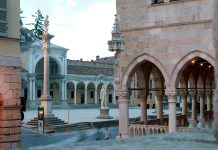interview: Maximiliano Crocamo
Interview: prof. Mauro Tretiach, deputy rector
The first day of classes following Italy’s decision to abolish the entrance exam for medical and dental schools was marked by both optimism and uncertainty at the University of Trieste. More than 600 aspiring doctors and dentists began a six-month trial program, where performance will determine who ultimately secures a coveted place.
At Trieste, 555 students enrolled in medicine and 92 in dentistry attended lectures split between two classrooms — one with a professor teaching in person, the other with a live video feed. Students must pass three exams in chemistry, physics, and biology. But with only 210 seats available in medicine and 40 in dentistry, success will likely depend on excelling, not just passing, given the complexities of national rankings.
The composition of the student body reflects broader regional trends: nearly 70 percent are women, and seven in ten come from Friuli Venezia Giulia, including one-third from Trieste itself. The rest largely hail from neighboring Veneto and 13 other Italian regions.
To accommodate the surge, the university has offered both in-person and remote options to help students meet mandatory attendance requirements. With hundreds of students vying for limited spots, the coming months will test not only academic performance but also the university’s capacity to manage the transition to a new admissions system.































